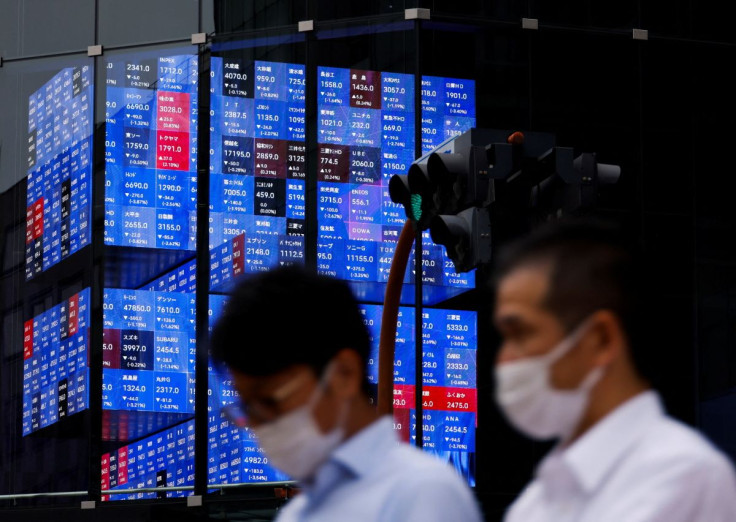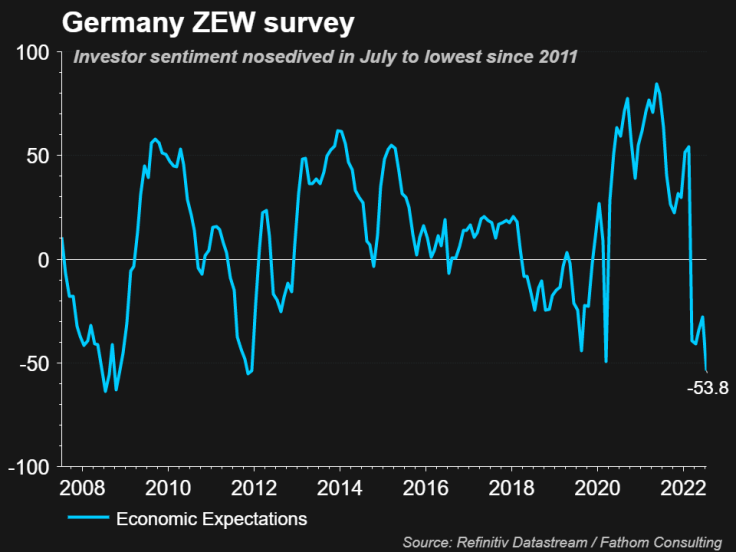Euro On The Brink Of Breaching Parity, Stocks Slide Again

The euro sank to within a whisker of parity with the dollar on Tuesday and stock markets fell as the prospect of further central bank tightening and worries about the health of economies worldwide unnerved investors.
The dollar's role as the safe-haven go-to currency for investors worried about the economic outlook has been burnished in recent weeks, with the U.S. currency roaring to two-decade highs against multiple currencies.
The euro has been particularly vulnerable given the impact of an ongoing spike in natural gas prices on the regional economy and the war in neighbouring Ukraine, and with the European Central Bank behind rivals in raising interest rates.
The single currency had dropped to a low of $1.00005 by 1030 GMT, its weakest since December 2002. It was last at $1.0011, down 0.3% on the day.
Graphic: Euro pulled towards parity-

The dollar index gained 0.3% to as high as 108.56, while sterling hit another two-year low and the yen was not far off its weakest in more than two decades.
"There doesn't seem to be a lot of support for euro at this point," said Sarah Hewin, senior economist at Standard Chartered. "It does not just relate to gas prices but to what seems to be a split within the ECB over how far they raise rates."
Business morale is also deteriorating in the euro zone with more worried about a recession. German investor sentiment fell sharply in July, according to a widely watched economic sentiment index published on Tuesday.
Graphic: ZEW-

The focus for this week will be macro data including U.S. consumer inflation on Wednesday, and comments from Federal Reserve officials as investors look for clues on the outcome of the Fed's upcoming policy meeting before the pre-meet blackout period.
A high inflation reading would add pressure for the Fed to step up its already aggressive pace of interest rate increases.
In equity markets, the Euro STOXX fell 0.3%, while German's DAX was off 0.8% and Britain's FTSE 100 was down 0.35%.
U.S. futures markets also pointed to a weaker open.
MSCI's broadest index of Asia-Pacific shares outside Japan fell 1.21% to its lowest level in two years, while Japan's Nikkei lost 1.77%.
Also high on investors' list of worries is the fact that a growing number of Chinese cities, including the commercial hub Shanghai, are adopting fresh COVID-19 curbs from this week to rein in new infections after finding a highly transmissible Omicron subvariant.
The surging cost of energy in Europe is also a major fear as the biggest single pipeline carrying Russian natural gas to Germany entered annual maintenance, with flows expected to stop for 10 days.
Investors are concerned the shutdown might be extended because of the war in Ukraine, restricting European gas supply further and tipping the struggling euro zone economy into recession.
The yield on benchmark 10-year Treasury notes was at 2.93%, having dropped back below 3% overnight as investors bought safe-haven Treasuries amid a sell-off on Wall Street.
Growth fears were also weighing on oil, despite concerns about tight supply.
Brent crude futures fell 2.3% to $104.7 a barrel, while U.S. West Texas Intermediate crude was at $101.42 a barrel, down 2.57%.[O/R]
Gold was steady, with spot prices trading at $1,734 per ounce.
Cryotcurrency prices dropped, with bitcoin last down 1.4% at $19,680.
© Copyright Thomson Reuters 2024. All rights reserved.




















